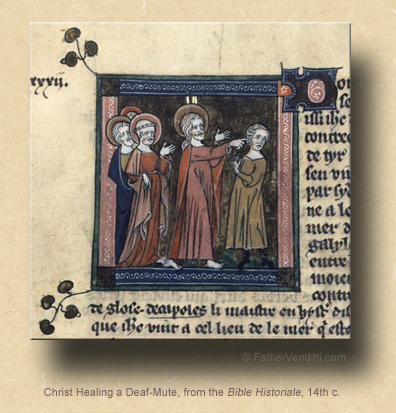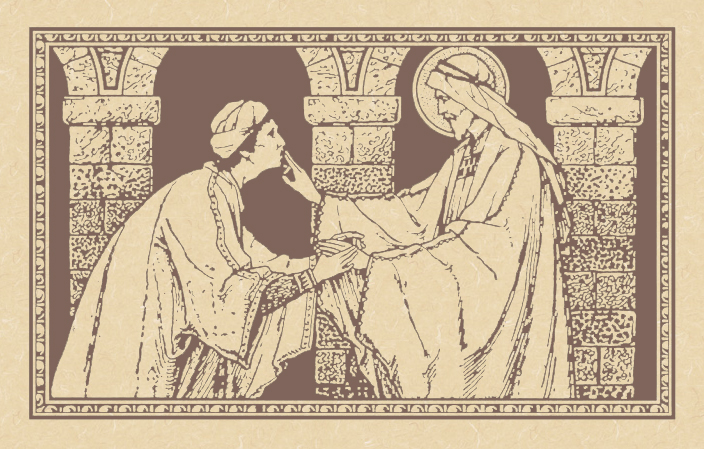Silence Is Not Always Golden.
The Fourth Thursday of Lent.*
Lessons from the feria, according to the ordinary form of the Roman Rite:
• Jeremiah 7: 23-28.
• Psalm 95: 1-2, 6-9.
• Luke 11: 14-23.
The Fourth Thursday of Lent; and, the Commemoration of Saint John of Capistran, Confessor.**
Lessons from the feria, according to the extraordinary form of the Roman Rite:
• Jeremiah 7: 1-7.
• Psalm 144: 15-16.
• Luke 4: 38-44.
FatherVenditti.com
|
 6:40 AM 3/28/2019 — It is a fact that sickness is often a Biblical allegory for sin. That shouldn't cause us to fall into the mistake of thinking that the cures our Lord performs are not real;—they are actual historical events that the Evangelists have recorded for us—but, they are highly symbolic as well, and the Evangelists accentuate them not simply to show our Lord's divinity, but because of their allegorical value. The Jews of our Lord's time, remember, regarded physical handicap as a sign of God's displeasure: a person was blind or deaf or lame or, in the case of the man described in today's Gospel lesson, mute because he had sinned or, if he was born that way, because of a sin inherited from his parents. Remember, when our Lord encountered the man born blind, His own disciples asked him, "Rabbi, who has sinned, this man or his parents, that he should be born blind?" (John 9: 2 Douay-Rheims). And the cures that Jesus brings about on these occasions, in addition to simply being done to help someone in need, are most definitely intended by our Lord to represent the spiritual healing that He comes to effect in our lives. 6:40 AM 3/28/2019 — It is a fact that sickness is often a Biblical allegory for sin. That shouldn't cause us to fall into the mistake of thinking that the cures our Lord performs are not real;—they are actual historical events that the Evangelists have recorded for us—but, they are highly symbolic as well, and the Evangelists accentuate them not simply to show our Lord's divinity, but because of their allegorical value. The Jews of our Lord's time, remember, regarded physical handicap as a sign of God's displeasure: a person was blind or deaf or lame or, in the case of the man described in today's Gospel lesson, mute because he had sinned or, if he was born that way, because of a sin inherited from his parents. Remember, when our Lord encountered the man born blind, His own disciples asked him, "Rabbi, who has sinned, this man or his parents, that he should be born blind?" (John 9: 2 Douay-Rheims). And the cures that Jesus brings about on these occasions, in addition to simply being done to help someone in need, are most definitely intended by our Lord to represent the spiritual healing that He comes to effect in our lives.
Keeping this clearly in mind as we read the Holy Gospels, we cannot help but notice that, in the way Jesus acts toward the sick, He is giving us an image of the sacraments. Saint John Chrysostom, commenting on today's Gospel lesson, tells us that this man “was unable to present his request himself, because he was dumb; he was unable to ask others to do it either, because the devil had tied his tongue, and together with his tongue he had bound up his soul” (Homilies on the Gospels, 32, 1).
How many times have we left the confessional only to remember later that there was something we needed to say to our Lord, but had forgotten to say it? More common, perhaps, is the phenomenon rooted as much in psychology as in spirituality, wherein someone will go to confession with every intention of making a clean breast of everything, but simply can't get it out: maybe they're embarrassed; maybe the sin occurred in the midst of some traumatic experience that the individual finds difficult to relive; maybe it's just been so many years since someone confessed that he's afraid of what the priest will say, forgetting that he's not telling his sins to the priest, he's telling them to Christ.
In today's Psalm, we all prayed:
Oh, that today you would hear his voice: “Harden not your hearts as at Maribah, as in the day of Massah in the desert, Where your fathers tempted me; they tested me though they had seen my works” (Psalm 95: 8-9 NABRE).
The historical reference is to events recorded in Exodus 17 (cf. v. 7); but, the meaning in the context of today's Mass is not a hardening of one's heart as a result of obstinacy; it's a hardness brought about by a lacking in the virtues of Faith and Hope: we either doubt the Truth of the Faith, that Christ can and does forgive our sins in confession, or we presume against our Lord's infinite mercy and doubt our Lord's desire to do so. And here is where the Devil comes into play, and why so much is said about him in today's lesson: the result of this fear and presumption is silence, preventing us from going into the confessional at all, or, once we're in there, preventing us from speaking what needs to be spoken. This, of course, serves the Devil's purpose, because a sin not confessed is a sin not forgiven.
Now, it is a fact that, if our emotional state is such that we fail to speak a sin in confession because we simply can't muster the courage to do it, our Lord, who knows all our sins from the get-go, makes up for that handicap and forgives the sin anyway, which is why it's not necessary to run back to confession the next day or the next hour to try it again; it's simply sufficient, the next time one goes to confession, to mention what happened. And it doesn't matter how long it's been, or how terrible we think the sin may be. “Come back to the Lord your God,” says the prophet Joel; “he is ever gracious and merciful, ever patient and rich in pardon; threatens he calamity, even now he is ready to forgive” (Joel 2: 13 Knox).

* Because Lent began on a Wednesday, today is the 4th Thursday. Cf. the post here under the heading "Hey, aren't you off by a week?" for an explanation of how the days of the liturgical calendar are rendered on this site as opposed to how they are designated in the Roman Missal.
** In the extraordinary form, this ferial day of Lent is dedicated to the holy physicians Cosmas and Damian; hence, the Collect for today's Mass: "May the blessed feast of Your saints, Cosmas and Damian, glorify You, O Lord; for on this day in Your marvelous providence, You gave them glory everlasting, and gave us their help." It is presumed that this custom is a carry-over from the Eastern Churches, in which these saints are particularly venerated, and for which this day is a holy day.
The Franciscan John of Capistran preached a crusade which delivered Europe from the Mohammedans in the fifteenth century. He died in 1456. His commemoration is made by an additional Collect, Secret and Postcommunion added to those of the feria.
|

